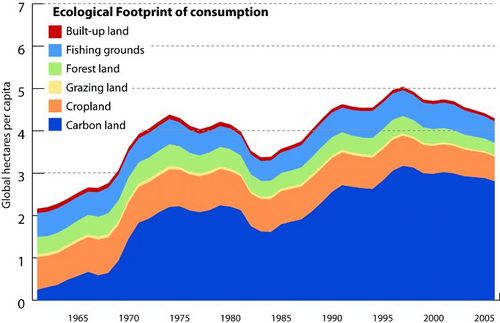December 19, 2010
First Study of Japan's Ecological Footprint Released
Keywords: Climate Change Ecosystems / Biodiversity NGO / Citizen
WWF (World Wide Fund for Nature) Japan, an environmental conservation organization, and Global Footprint Network released a report, August 25, 2010, detailing for the first time Japan's ecological footprint.
According to the result of the analysis, Japan's ecological footprint was 4.1 global hectares (gha) (*1) per capita in 2006, 1.5 times the world average, whereas its biocapacity was 0.6 gha per capita, which is one-third the world average. This means that Japan depends on imports to make up for the shortage. If everyone in the world lived the same way the Japanese do, it is estimated that we would need 2.3 Earths.
In Japan, 65 percent of its total ecological footprint is made up of its carbon footprint, and its carbon footprint in the late 1990s was 13 times higher than in 1961. Looking at ecological footprint in terms of household consumption, food accounts for a large part (36%) of total household consumption, and food waste in Japan has reached 13.8 million tons per year based on 2005 data -- 1.7 times the volume of food aid worldwide. Thus, reducing food waste will substantially improve Japan's total ecological footprint.
Regarding the country's carbon footprint, WWF Japan submitted a petition to the Japanese government related to the specific use of the ecological footprint as an environmental indicator. WWF Japan explains in the petition that reducing carbon dioxide emissions through the introduction of domestic emissions trading and an environmental tax would lead to a decrease in the country's overall ecological footprint.
Note 1: Biological productivity varies depending on the climate and utilization form. Gha is a measurement used to standardize biological productivity by adjusting those differences. One global hectare is equivalent to one hectare of land with average biological productivity.
ECOLOGICAL FOOTPRINT REPORT JAPAN 2009
MAINTAINING WELL-BEING IN A RESOURCE CONSTRAINED WORLD
http://www.wwf.or.jp/activities/lib/lpr/
WWF_EFJ_2009e.pdf
Posted: 2010/12/19 06:00:15 AM
Related
"JFS Newsletter"
- 'What Are the Roles of Zoos Today?' - Interview with Director of the Popular Asahiyama Zoo
- Nishiawakura's Initiative for 100% Energy Self-Sufficiency, and a Municipal ICO Scheme
- 15-Year Integrated Forest Environment Education in Shimokawa, Hokkaido to Support Sustainable Forest Management
- Fifth Contest to Award Excellent Environmental and Social Practices by Junior High, High School Students
- Increase Revenues without Increasing Catches -- How the Sustainable Sakura Shrimp Fishery in Suruga Bay Does It



